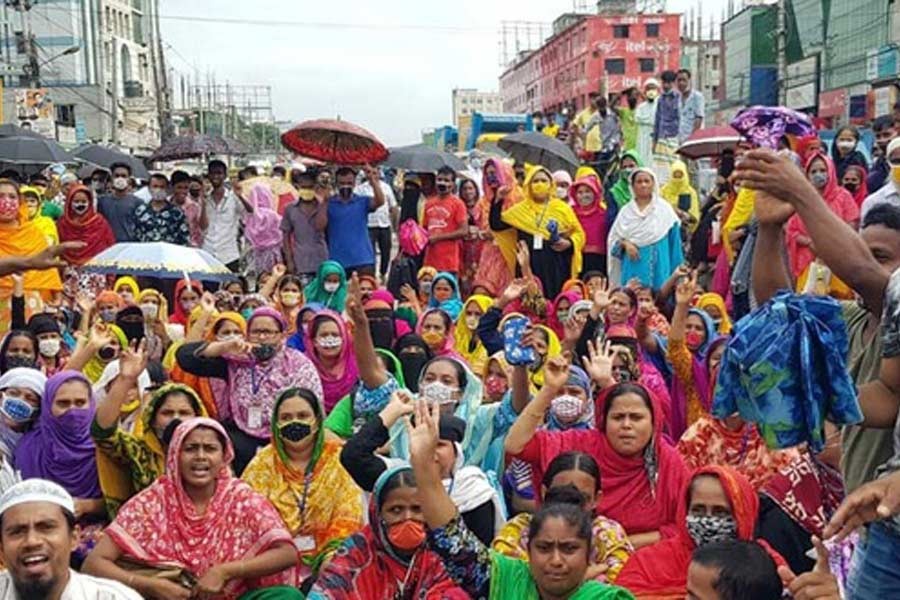The country's six industrial zones witnessed more than 100 incidents of labour unrests last month mainly over non-payment of wages. Besides, workers of some 1,004 factories are yet to get the wages for the month of May until first half of this month (July).
Of the 1,004 units, according to reports, 558 are non-RMG and 436 textiles and RMG factories. The remaining 10 factories are registered with the Bangladesh Export Processing Zones Authority (BEPZA). At least 134 out of 1,882 member factories of Bangladesh Garment Manufacturers and Exporters Association (BGMEA) did not pay wages for the month of May until last month. There are also some factories which received loans from the government-announced stimulus package to pay wages in April while in May they did not get the fund from the banks on various excuses.
However, the BGMEA claimed that only 40 factories did not pay the wages for the month of May. Some 1,886 out of 1,926 member units of BGMEA already paid the wages for the month of May, it said.
All said and done, the industrial sector is becoming vulnerable to labour unrest. Non-payment of dues and festival allowance and workload are among other reasons that might fuel unrest. At least 790 factories that include textile and RMG across the country are vulnerable to labour unrest over payment of wages and festival allowance ahead of Eid-ul-Azha.
Of the total 790 factories, some 382 are members of BGMEA. Some 92 are registered with BKMEA and 40 are affiliated with Bangladesh Textile Mills Association (BTMA).
Thirty-two factories under the Bangladesh Export Processing Zones Authority (BEPZA) might face unrest over non-payment of wage and other allowances.
The number of non-RMG factories is 244 and they all run the risk of witnessing labour unrest. The listed units are located in six Industrial Police (IP) zones in Ashulia, Gazipur, Chattogram, Narayanganj, Mymensingh and Khulna.
The IP officials are now closely monitoring these factories and holding meetings with the factory managements for timely payment to avoid any untoward incidents.
Concern and anxiety are mounting among the workers ahead of Eid. The workers are in dire straits and facing the risk of losing jobs amid the coronavirus pandemic.
According to BGMEA, 177 factories have been identified that might struggle with payments due to lack of work order and financing. Meantime, different organisations recently urged the government to take proper measures to bring a peaceful and permanent solution to the labour unrest in the garment sector. They expressed concern over the incidents of killing and torturing, vandalism and setting fire on garment factories.
Some union leaders claimed that a vested quarter is conspiring to create anarchy in the sector over the issue. Urging all workers to be alert against such activities, the labour leaders said creating an atmosphere of discussion could solve such anarchic situation in the industry.
Analysts say urgent, peaceful and permanent solution of any kind of unrest is a must. They demanded effective measures so that such incident would not take place in the future. Condemning the incident, they say a vested quarter committed such incidents creating confusion among the workers.
The fact remains that a good number of factories halted their production as they don't have work orders due to the ongoing coronavirus pandemic. Besides, factories mostly of small categories are not getting required support from the banks.
In the circumstances, both the owners and the workers need to show restraint and respect for each other's causes. An atmosphere of mutual understanding should solve most of the problems in the industrial sector.


